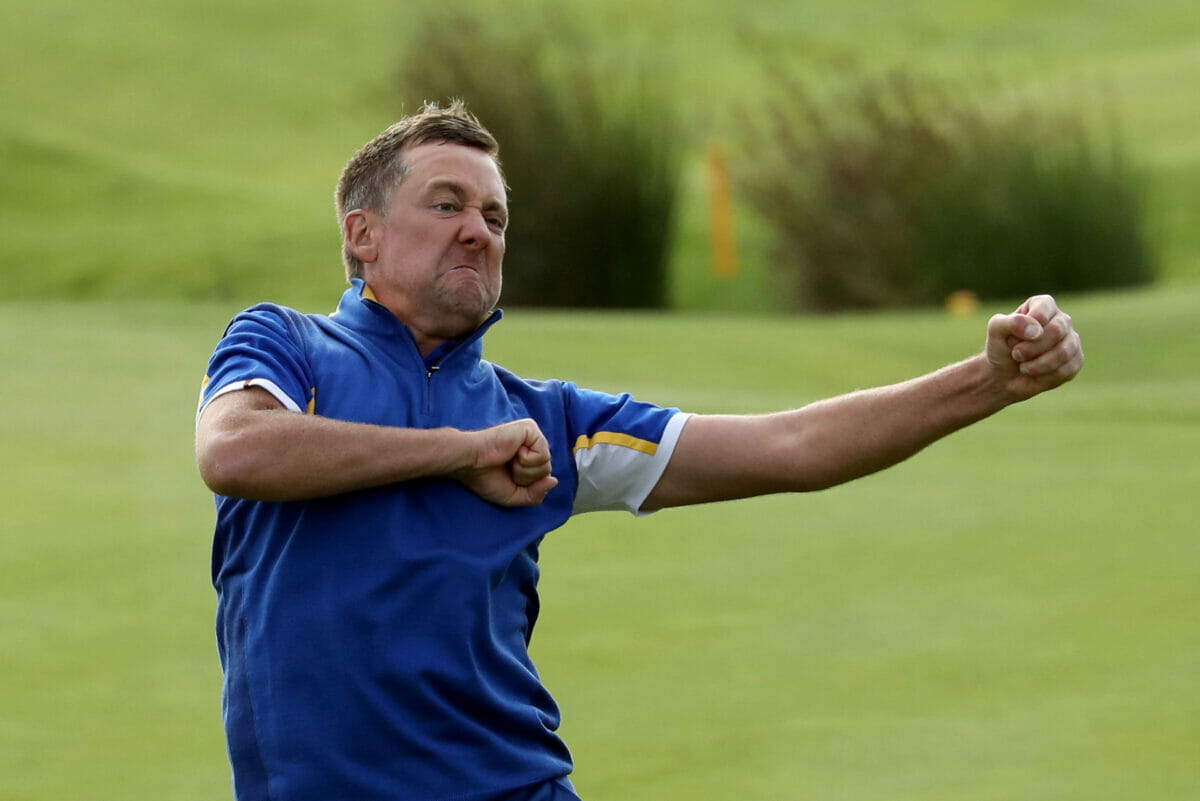The final chapter(s) in Ian Poulter’s Ryder Cup career may not yet be written, but irrespective of what lies in wait for the Englishman, legendary status in the Ryder Cup annals is assured.
Known for his flamboyant style of dress on the course and his outspoken and outgoing nature off it, Poulter is one of the most polarizing figures in the game today, but it’s his performances against the Americans for which he will be remembered best.
Born and raised in Hertfordshire, just north of London, Poulter began playing golf at the age of four along with his father and older brother Danny. Poulter would famously turn professional with a handicap of four, which is often cited as an example of his incredible self-belief. The reality is that the handicap was not reflective of Poulter’s skillset as he declined to play amateur competitions, instead focusing on practicing and giving lessons.
Having turned pro in 1996, Ian scraped around on the minor tours for a couple of years, making his breakthrough in 1999 when he claimed his first Challenge Tour win and successfully navigated European Tour Qualifying School later that year.
The Italian Open and the Rookie of the Year award would come in his maiden main tour season. Poulter narrowly missed qualification for the 2002 Ryder Cup side under Sam Torrance at the Belfry, but made amends by claiming the final automatic place for the 2004 running at Oakland Hills.
Unused on the opening day by captain Bernhard Langer, Poulter got his first taste of competitive action in the event alongside Darren Clarke against Tiger Woods and Chris Riley. It was a baptism of fire for the debutant as Woods rebounded strongly after suffering back-to-back humiliations alongside Phil Mickelson on the opening day – a partnership that Hal Sutton is still widely criticised for to this day.
Poulter would exact revenge on Riley the following day in the singles, scoring a 3&2 victory as Europe cruised to a nine-point victory. It was Europe’s widest margin of victory in the history of the event and that it came on American soil was even more astonishing.
After another near miss in qualification for 2006 – Ian Woosnam opted for Darren Clarke and Lee Westwood as his captain’s picks – Poulter was back in the side that travelled to Valhalla in Kentucky, albeit by way of a Nick Faldo captain’s pick himself. Faldo opted for Poulter and Paul Casey to much outrage in the Irish and Scottish press as Clarke and Colin Montgomerie were overlooked, with the former winning twice in recent months.
The last thing a player needs when entering a cauldron like the Ryder Cup is added pressure, and the furore surrounding Faldo’s picks had heaped additional burden onto Casey and Poulter’s shoulders. But diamonds are created by pressure, and it was at Valhalla in 2008 that Ian Poulter revealed the carats that he was carrying.
Though Europe would ultimately go down 16½ – 11½, Poulter played in all five matches, winning four, and was comfortably Europe’s highest points scorer. It was the first European defeat since 1999, and though Faldo’s captaincy would continue to draw criticism from all quarters, questions over his captain’s picks were conspicuous by their absence.
By 2010, the former Chesfield Downs assistant pro had risen to number 16 in the world and comfortably qualified for Celtic Manor. In a rain-sodden week, an entire session was lost as the course was unplayable Friday and Saturday morning, with the format reduced to four sessions instead of five, with all twelve players taking to the course in each of the middle two sessions in order to complete the requisite number of matches.
Ever-present once more, Poulter again finished top of the scoring charts for the Europeans with three wins from four. It’s cliché to say that every point counts in the Ryder Cup but it has never been truer than in 2010 where the destination of the cup wouldn’t be settled until deep, deep into the final match.
With a 66 percent team success rate, and a 75 percent personal success rate, Ryder Cup superstardom was already well on the way for the man who would become known as “The Postman” for his continued delivery on the big stage, but nothing could’ve prepared us for what has since become known as the “Miracle at Medinah.”
Having undergone a minor career slump in 2011 and early 2012, Poulter needed a phone call from José Mariá Olazábel to confirm his plane ticket to Illinois, but what would transpire would be arguably the single greatest performance by any one player in Ryder Cup history.
Partnering Justin Rose in the opening foursomes, Poulter finally got revenge over Tiger Woods for his debut loss in 2004. But that was as good as it got for the Europeans on day one as Poulter sat out the afternoon and America took a 5-3 lead. Rose and Poulter again combined for a win in the foursomes, but another three American wins left them in a commanding 8-4 lead with two sessions left to play.
In 1999, U.S. captain Ben Crenshaw famously finished his Saturday evening press conference by pointing at the assembled media and declaring that he was a believer in fate, and that he had a feeling… I’m not sure there were many believers in the European camp as they lost the first two four-ball matches on Saturday to fall 12-6 behind, but Garcia and Donald, and Poulter and McIlroy were still on the course.
And Poulter still believed. McIlroy – the world number one at the time – took a back seat as a chest-thumping Poulter took a defibrillator to a European side that was circling the drain. Five birdies in a row saw the Europeans snatch a breath-taking 1-up victory that changed the entire dynamic of the competition. In need of a miracle, Europe’s messiah arrived, and suddenly 11 others were believers in fate.
What followed on Sunday was one of the greatest televised sporting events of all time. With Europe needing a fast start, Olazábel sent out the big guns early. Poulter was out second and took out Webb Simpson to claim his fourth point from four matches. The charge set during the five-hole flourish had detonated and the American’s were bleeding profusely on course. The day may have belonged to Europe, but the week belonged to Poulter.
By the time 2014 came around, Paul McGinley was never in doubt about selecting The Postman for another captain’s pick – how could you leave him out? – but the reality was that the hero of 2012’s form had gone sharply downhill. He wasn’t helped that rookie partner Stephen Gallagher was a bag of nerves in the opening four-ball match, or that they ran into the team of Jordan Spieth and Patrick Reed, who are by a distance America’s most successful partnership since the turn of the millennium.
Not quite the heroics of Medinah but this time they weren’t required. A half against Webb Simpson kept his unbeaten singles record alive and made it four successes in five Ryder Cups for European teams featuring the colourful Englishman.
Poulter’s continued to struggle with form and injury throughout 2015 and 2016, so much so that he wasn’t even in consideration for a pick when Darren Clarke was in the hot seat, meaning Europe’s talisman was nowhere to be seen as the Americans recorded only their second victory since the turn of the century. Coincidence? Most likely, but the European scalp most coveted remained elusive.
Having been ranked as low as 207th in the world golf rankings in early 2017, a healthy and rejuvenated Poulter worked his way back up the rankings and back into the reckoning of Thomas Bjorn with Le Golf National in mind.
When the inevitable wildcard election came, it was Poulter’s fourth captain’s pick in six appearances. In truth, it wasn’t vintage Ryder Cup Poulter, but when vintage Poulter was 2012, they are tough shoes to fill. Still, a two-win, two-loss performance wasn’t bad, particularly when you consider the 2-up singles triumph over Dustin Johnson.
Now 44 and well into the back-nine of his career, the father of four is far from finished with the Ryder Cup. With the clock ticking, the uncertainty surrounding the 2020 edition doesn’t bode well, but would you dare leave a fit and healthy Poulter out?
At present, his record stands at 14-6-2, taking five-and-a-half of six points in the singles, and just once ending up on the losing side. No one really does Ryder Cup celebrations quite like Poulter, and it’s a sight that’s become extremely familiar every other September.
Is it any wonder the Americans hate the sight of him?
Ian Poulter, a true Ryder Cup legend.























Leave a comment